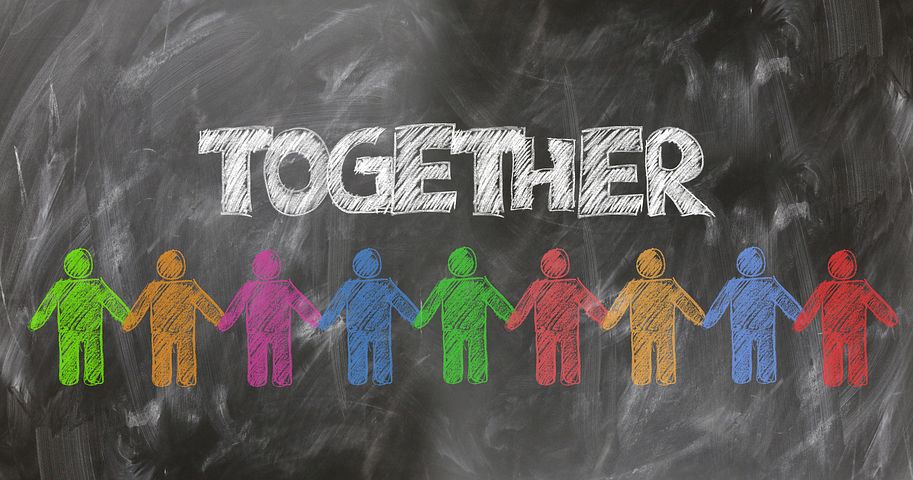How to collaborate successfully for greater impact

Managing one culture is tricky enough but what about when two or more organisations want to work together to achieve a shared outcome? How can they ensure their cultures work together for the benefit of the beneficiary rather than unwittingly competing against each other? Here Sarah Carter, Culture Consultant, explores what to be aware of when collaborating with others.

The theme of this year’s IFC is ‘Together We Can’.
Whether we’re working with volunteers, corporate partners, beneficiaries or other social impact groups, collaboration can make the work we do so much more impactful – if we’re doing it for the right reasons.
Of course, there are times when it makes more sense to work with others rather than going it alone and other situations when it may detract from the organisation’s activity. The most important question to ask is: how will collaboration make what we do more effective for our beneficiaries?
Focus on the benefits to the beneficiary and not the benefit to brand reputation
Working in collaboration with others can sound great but it can also take a lot of time, effort and money. The reasons for partnerships need to be strong. Do you have a shared goal? Is there the possibility to share costs and so reduce the financial commitment required from individual organisations? Can your resources be used more effectively working with others? Could working together increase your reach to potential supporters, financial donors, to more diverse groups and beneficiaries? Do other organisations have an area of skill and expertise that you – and ultimately the beneficiary – could benefit from? Is there any one partner that feels they’re bringing more to the relationship than the other? If so, is this the right place for them? Do potential collaborators have individuals who could bring more value to the cause than when working alone?
We all have our own strengths – working together can give us a unique superpower where our sum is stronger than our individual parts. Does working in partnership decrease the duplication of work being done?
Who makes the decisions?
Then there’s the question of leadership. Who will actually manage the project on a day to day basis? How are decisions made? Where does the resource come from? Will you always speak as one or are there times when you will speak as an individual organisation? What if you disagree? Do the leaders in the organisations want the same thing? Are they in agreement on where the benefit for the beneficiary lies and the route to getting there? Ensure that whatever’s agreed is written down.
What’s easy to miss is whether there’s a cultural fit between partners – in their leadership style, in the way they communicate, in how they go about business, in their values. Whilst you may all want the same outcome, if the route you think you should take to get there is fundamentally at odds, there could be trouble ahead. Spend time getting to know your partner – like any relationship, don’t jump in without being sure there’s enough common ground – but not so much that you can’t learn and grow from each other!
Communicating to your team
It’s really crucial to communicate the ‘why’ to your internal team and your volunteers. They need to understand your partners, their values, your common goals, where the leadership is coming from, how they can feed into ideas and plans, when they are able to challenge and when it’s not appropriate. You’ll need to bring the whole organisation with you – as with anything you do, your people are fundamental to making the partnership work, in meeting key deadlines, building relationships, providing access to the necessary information and resources.
Each partner needs to have an understanding about the other one’s culture so that teams can work together effectively. Be clear on how the collaboration may impact on your team’s roles and any expectations you may have of them. Think about responsibilities around GDPR and confidentiality. Ensure it’s a dialogue rather than feeling like something that’s being imposed on your team. Great ideas can come from anywhere within the organisation so don’t close them off.
If you want people to stay engaged and motivated, ensure that any evidence of success – however small – is communicated regularly. If people can see the positive impact of the collaboration, they’ll continue to support you in making it work.
Communicating to the public
Be careful how you communicate to the outside world and make sure it doesn’t ruffle feathers. Even basic things like the order in which organisations are mentioned and whose logo is biggest need thought and agreement. There’s nothing like a bit of logo envy to dampen a blossoming relationship. Have a comms plan written down so all parties and their teams have agreed guidelines for reference. When talking to the public, always keep the focus on the quality of the outcomes – on what the collaboration will give to the beneficiary.
Regular check ins
As with any project, checking in regularly with where things are at is crucial. Is there evidence that your partnership is achieving its objectives? Are you achieving more by working collaboratively or would you, in retrospect, be better to work alone? Do you all still have the same goals? What has gone well and what not so well? Are there areas where improvements need to be made or original assumptions around the partnership and its activities challenged?
Always return to your original intention and what activity will give your beneficiaries the best outcome.
To experience 4 days of radical collaboration, register for IFC 2018: Together We Can, 16-19 October in Holland.
7 Comments
Richard Turner · October 12, 2018 at 12:40
Great piece Sarah. Increasingly its going to be important – as organisations articulate impossible dreams (their WHYS) that will need collaboration to help achieve them. In our world we should “brand the dream not the organisation” a wise sage told me several times.
copter io · April 20, 2021 at 09:49
Share with all forum members about io game features on a laptop computer. Join and experience the latest versions of io games and join new records on the io games platform.
888b · December 9, 2021 at 13:33
Thank you for sharing this great article. 888b hopes you will have many more articles for everyone to read.
globle · May 25, 2023 at 04:55
Wow, this is great. According to my opinion, this is one of the best posts ever written. The quality of your work is very remarkable. It’s very appreciated.
willsaldana · July 5, 2023 at 10:42
I was just looking for information on the web when I came across your post io games unblocked
TomHiddleston · November 29, 2023 at 09:45
I saw this topic after using a free time card calculator. It’s beneficial content.
jennerK · July 16, 2024 at 11:45
I hope you keep giving the community great material wordle unlimited